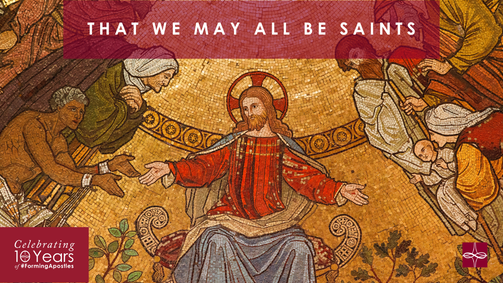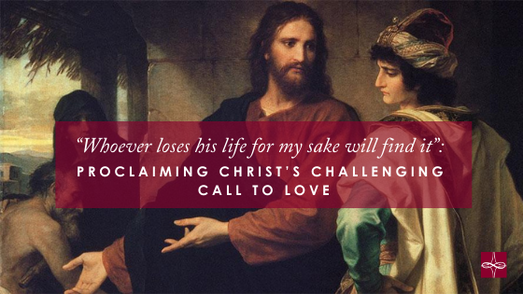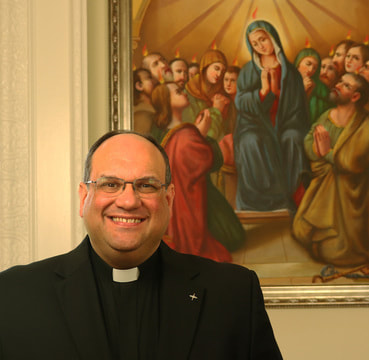|
When you ask someone which of Pope Francis’ writings they think of first, you’re likely to hear Evangelii Gaudium, maybe Christus Vivit if you’re talking to someone in youth or young adult ministry, Laudato Si if the person is particularly environmentally conscious, or Amoris Laetitia for those who work in family ministry. The two that, by my estimation, might be least likely to be mentioned are Lumen Fidei (which was Pope Francis’ first papal document and was written by both he and Pope Emeritus Benedict XVI) and his Apostolic Exhortation Gaudete et Exsultate. This is a real tragedy because Gaudete et Exsultate might be one of the most important writings in Pope Francis’ pontificate, though I know that since I’ve said this, he’ll write something even better. Recently, the Church has celebrated the Solemnity of All Saints and the Commemoration of All Souls. On All Souls Day, the Church prays for all of the faithful departed, for the souls in Purgatory who will, one day, be welcomed into the Eternal Banquet. The Solemnity of All Saints celebrates all of the Saints in Heaven, both those great saints who are venerated in churches across the world, and those “saints next door”. In Gaudete et Exsultate, Pope Francis writes, “very often it is a holiness found in our next-door neighbours, those who, living in our midst, reflect God’s presence… Let us be spurred on by the signs of holiness that the Lord shows us through the humblest members of that people which ‘shares also in Christ’s prophetic office, spreading abroad a living witness to him, especially by means of a life of faith and charity’.” He reminds us that holiness is not just for those who are called to do great things, but by all of those who live a life of faith and who are followers of Jesus. We often see prominent Catholics telling us to “do great things”. They get this from Pope St. John Paul II who said to young people at World Youth Day in 2000, “It is Jesus who stirs in you the desire to do something great with your lives, the will to follow an ideal, the refusal to allow yourselves to be grounded down by mediocrity, the courage to commit yourselves humbly and patiently to improving yourselves and society, making the world more human and more fraternal.” And the great Saint has a point: when the world leads us to such mediocrity, a mediocrity which leads us to individualism, relativism, and complacency, the Lord Jesus leads us to greatness. What I think can be lost in translation, at times, is that this greatness is not worldly greatness. This greatness which Pope St. John Paul II spoke of is the greatness that a life of faithful missionary discipleship can bring. Greatness that is marked by hope, by a rich and abounding charity towards our neighbor, by a gentleness that comes from resting in eternal truth, and by a trajectory that always moves, as Bl. Pier Giorgio Frassati would say, “verso l’alto”, or “to the heights.” In Gaudete et Exsultate, Pope Francis leads the People of God on this journey to greatness which, when properly viewed, is indeed the journey to holiness. He reminds us that the Scriptures give us regular calls to holiness, a theology which was explored and articulated more deeply and precisely at the Second Vatican Council. He reminds us that, “This holiness to which the Lord calls you will grow through small gestures,” in a way echoing the words of St. Teresa of Calcutta who said, “not all of us can do great things, but we can do small things with great love.” Maybe this is the greatness which Pope St. John Paul II was speaking about to those young people over two decades ago. Not greatness which is pursued for any individual person’s gain, but great love. Love which seeks to echo the love of Jesus Christ on the Cross, love that wills the good of the other. This love is articulated in the Beatitudes, which Pope Francis calls “the Christian’s identity card.” Pope Francis gives us a deep and insightful document in Gaudete et Exsultate. He gives us cause to reflect on our lives and on the holiness which the Lord calls us to. He reminds us that we can’t do the Christian life alone and that our living of that life will make us counter cultural. We should find great cause for hope in Gaudete et Exsultate. In the words of Pope Francis, may we, “ask the Holy Spirit to pour out upon us a fervent longing to be saints for God’s greater glory, and let us encourage one another in this effort. In this way, we will share a happiness that the world will not be able to take from us.” For more resources on Pope Francis, click here for our Pope Francis Portal. For more resources on Gaudete et Exsultate, click here for our resource page.
0 Comments
When you hear the word “vocation” what comes to mind?
In my last year of college, vocation seemed like a puzzle to be solved. I put a lot of pressure on myself to figure out “what should I do with my life.” I met with a spiritual director and weighed several options, agonizing over how I would know which was the right choice. Although my spiritual director and many other people in my life tried to tell me that I didn’t have to figure out the entirety of my life just yet, I wasn’t listening. I had a very narrow view of vocation as something to be discerned once and only once. I thought, if you’ve done it right, you stick with your choice for your whole life. I imagined that God had my life mapped out for me and there was a very definite direction I should take; I just needed to figure out which it was. Now, 11 years later, I realize just how much God’s grace has been at work in me in so many ways—especially in broadening my understanding of vocation. I’ve come to really appreciate that discerning one’s vocation is not like completing a task at which we can excel or fail. It’s not a question with a single right answer. In fact, God’s plan for us is none other than to be holy, and to do so in ways specific to us, “to reflect and embody, at a specific moment in history, a certain aspect of the Gospel” (Gaudete et Exsultate, 19). The Second Vatican Council’s Dogmatic Constitution on the Church speaks of this universal and personal call to holiness by saying that “all the faithful, whatever their condition or state, are called by the Lord – each in his or her own way – to that perfect holiness by which the Father himself is perfect” (Lumen Gentium, 11). Each and every one of us has this fundamental vocation, the one that underlies every other particular way in which God calls us to holiness. Holiness isn’t lived out in a single grand way possible for only a select few; “We are all called to be holy by living our lives with love and by bearing witness in everything we do, wherever we find ourselves” (Gaudete et Exsultate, 14). In Gaudete et Exsultate, Pope Francis issues a powerful summons: “You too need to see the entirety of your life as a mission” (GE, 23). With this broader view of vocation, I can more readily recognize the multitude of ways in which God has drawn me to himself throughout the course of my life. I can discern how I am being called to holiness in this moment and reflect on how my response in the here and now is part of my greater life’s mission. Now I understand vocation as more than a single call. It is, rather, living our lives in a constant awareness of and responsiveness to the promptings of the Lord, who draws us to himself. Vocation is not inward looking; it draws us outward to God and neighbor. This redirected gaze allows us to recognize and receive with gratitude the gifts we are given so that we can more freely and truly make a gift of ourselves. Such self-emptying love is what it means to be Christ-like, to be holy. It forces us to reframe our questions. Instead of asking, “What do I want to be?” or “What do I want to do with my life?” (as I kept asking myself in college), we can prayerfully discern “How is God calling me to make a gift of myself?” This certainly applies to my state in life, whether I am called to give of myself in marriage or religious life. But I also respond to this call to self-gift by carrying out my work with integrity and skill in the service of my brothers and sisters, by patiently teaching my little ones how to follow Jesus, by refusing to gossip, and by saying a kind word to the person I encounter on the street (to list a few examples from Gaudete et Exsultate 14- 16). My life’s journey has taken a lot more turns than I could have anticipated those many years ago. Yet the Lord has made use of each step, big and small, to draw me ever closer to himself. Click here for more resources on Vocational Discernment. 9/7/2021 “Whoever loses his life for my sake will find it”: Proclaiming Christ’s Challenging Call to LoveRead Now
“Then Jesus said to his disciples, ‘Whoever wishes to come after me must deny himself, take up his cross, and follow me. For whoever wishes to save his life will lose it, but whoever loses his life for my sake will find it’” (Mt 16:24-25).
This summer, I’ve been blessed with the opportunity to work as an intern for the Catholic Apostolate Center and collaborate on several catechetical projects with other staff members there. One of these projects was the creation of a new version of From Practicing Catholics to Apostles on Mission, a faith formation course for those who want to delve more deeply into their faith and become more actively involved in the Church. Since many of the program’s participants are young adults, drafting lessons for this course allowed me to reflect on the unique opportunities and challenges that come with speaking to young adults about the Faith. This task always involves a special focus on presenting Church teaching in a way that is clear, approachable, and attractive. But with this task comes a special challenge: how can we avoid the temptation to “water down” the faith or to omit or sugarcoat its more difficult truths? How can we imitate the most perfect preacher, who stated plainly: “Take up your cross and follow me” (Mt 16:24)? One of the Apostles on Mission sessions on which I worked focuses on the universal call to holiness. It seems to me that this teaching is one that we must take care to proclaim in its fullness, especially when speaking to young people: “The Lord Jesus, the divine Teacher and Model of all perfection, preached holiness of life to each and every one of His disciples of every condition…Thus it is evident to everyone, that all the faithful of Christ of whatever rank or status, are called to the fullness of the Christian life and to the perfection of charity” (Lumen Gentium 40). This message shatters the common assumption that holiness is attainable by only a few individuals who perform extraordinary works. It reveals that holiness consists instead in the “perfection of charity” and thus is truly possible for everyone, because although we cannot all accomplish great or miraculous deeds, we can all act with great love. Proclaiming this universal call to holiness is particularly important because—while we hear the commandments over and over—"Love the Lord your God with all your heart…Love your neighbor as yourself”—a very subtle but serious temptation can creep in. Namely, we can be tempted to love only when it is easy, when we find the other person agreeable, when we think they deserve it. But in fact, the perfect love that Christ commands is often difficult. It is difficult to love God daily by resisting temptation, practicing self-denial, and committing ourselves to regular prayer. It is difficult to love our neighbor on a daily basis by treating them with patience, forgiving their faults, and making a generous gift of ourselves to them. Pope St. John Paul II summarized it well in his address to the young people of Boston: “Real love is demanding. I would fail in my mission if I did not clearly tell you so. For it was Jesus—our Jesus himself—who said: ‘You are my friends if you do what I command you’ (Jn 15:14). Love demands effort and a personal commitment to the will of God. It means discipline and sacrifice, but it also means joy and human fulfillment” (Holy Mass on Boston Common, 1979). St. John Paul II not only acknowledges the difficulty of Christ-like love, he also emphasizes that he has a duty to proclaim this difficulty to the Church. He recognized that if we are not warned that “real love is demanding,” we will inevitably discover this reality through our own experience. And if we are not prepared for difficulty, one of two tragic results will likely occur. Finding love demanding, we may be tempted to believe that Jesus didn’t really mean “Be perfect, just as your heavenly Father is perfect” (Mt 5:48) and might ease up and only love when it is easy. Alternatively, we might be tempted to give up in despair, like the rich young man of the Gospel who was taken aback by Jesus’ demanding invitation and “went away sad” (Mk 10:22). Although we must proclaim to young people the difficulty of what Jesus commands, we can also provide them with the hope that enables all Christians to rise to the challenge that lies before them. The first hopeful reminder is this: God is the one who sanctifies us, who always gives us the grace we need to fulfill his call. Cooperating with this grace does require that we are willing to say “yes” to the daily opportunities to undertake the difficult work of loving. But the further hopeful news is that God generously provides hundreds of these opportunities every day. As Pope Francis illustrates in his apostolic exhortation, Gaudete et Exsultate: “This holiness to which the Lord calls you will grow through small gestures. Here is an example: a woman goes shopping, she meets a neighbour and they begin to speak, and the gossip starts. But she says in her heart: ‘No, I will not speak badly of anyone.’ This is a step forward in holiness. Later, at home, one of her children wants to talk to her about his hopes and dreams, and even though she is tired, she sits down and listens with patience and love. That is another sacrifice that brings holiness. Later she experiences some anxiety, but recalling the love of the Virgin Mary, she takes her rosary and prays with faith. Yet another path of holiness. Later still, she goes out onto the street, encounters a poor person and stops to say a kind word to him. One more step.” A third word of hope: Every time we take one of these “steps”—loving even when it is hard—we train our heart, like runners training for a marathon. With each step, our heart grows stronger, and it becomes easier to love the next time. One more message of hope can be found at the end of St. John Paul II’s words that I quoted before: “[Love] means discipline and sacrifice, but it also means joy and human fulfillment” (my emphasis). This message was closely echoed by another great saint of modern times: St. Teresa of Calcutta. She wrote: “We should ask ourselves, ‘Have I really experienced the joy of loving?’ True love is love that causes us pain, that hurts, and yet brings us joy. That is why we must pray and ask for the courage to love.” When we consider the words of both saints, there initially seems to be a contradiction—how can love cause both pain and joy? But this is ultimately the same paradox that lies at the heart of the Gospel: Christ promises that only he who “loses his life for my sake will find it” (Mt 16:25)—that is, only if we “lose” our life in self-giving can we find lasting fulfillment in this life and eternal happiness in the next. It takes courage and great faith to believe in this promise of Christ, but there are two places we can find evidence to support it. The first is in the witness of St. John Paul II and St. Teresa of Calcutta themselves, along with the countless other saints whose lives witnessed to the truth of their words. These men and women loved with total generosity even when it was difficult; they faced many additional sufferings, and yet they were filled with joy—a joy so radiant and constant that it could not have been a mere appearance. We can also find evidence in our own experience that proves the opposite side of this truth: when we have tried to fill our hearts and lives with things that aren’t God, we have all experienced how quickly happiness flees and gives way to emptiness and sorrow. By witnessing the joy of the saints and recalling our own sorrow when we deviate from the path they trod, we can trust that over time, as we continue the demanding work of striving to love as Christ loved, He will gradually reshape our hearts and help us experience the joy that sacrificial loving brings. In summary, when we share the Gospel with young people, we must take care to speak the fullness of the truth and tell them of both the joy and suffering that accompanies the lives of those who follow Christ. By doing so, we help them avoid the fate of those who excuse themselves or fall into despair when they feel the weight of the cross. But even more, doing so helps them find the narrow path that leads to the life they most desire, “life in its fullness,” as St. John Paul II describes: “Jesus does not ask us to give up living, but to accept a newness and fullness of life that only He can give. The human being has a deep-rooted tendency to ‘think only of self,’ to regard one’s own person as the center of interest and to see oneself as the standard against which to gauge everything. One who chooses to follow Christ, on the other hand…looks on life in terms of gift and gratuitousness, not in terms of conquest and possession. Life in its fullness is only lived in self-giving, and that is the fruit of the grace of Christ: an existence that is free and in communion with God and neighbor” (Message for World Youth Day XVI, 2001). It has been a great gift to collaborate with the Catholic Apostolate Center in their efforts to help others recognize and respond to God’s call to holiness, to the fullness of life. May all of us—of every age—heed this call. May we have the courage to proclaim the fullness of the truth, the strength to love when it is difficult, and the confident hope that doing these things will bring the profound peace and joy that we seek.
 As the pandemic eases in the United States and much begins to reopen, we have the opportunity to reflect on where we have been as Church and what we are called to do. Many are still suffering around the world and in the U.S. from the effects of the pandemic. This moment is a unique one to revive faith and rekindle charity as apostles of Christ. The Dogmatic Constitution on the Church of the Second Vatican Council, Lumen Gentium, reminds us: “The holy people of God shares also in Christ's prophetic office; it spreads abroad a living witness to him, especially by means of a life of faith and charity and by offering to God a sacrifice of praise, the tribute of lips which give praise to his name” (12). We are co-responsible as the baptized to witness Christ in what we say and do. If we say that we are believers in Jesus Christ, then we need to show our faith by what we do for others. Seems easy. It is not, as we know. We cannot go about it alone. We need the grace provided by Christ, particularly in the Sacraments, especially the Eucharist. This is why livestreams of Mass are not enough. We need to receive Christ in the midst of the community of faith, the Church, and then strengthened by him and the community, we can go forth in his name, doing his mission. What an amazing responsibility we have! To live it well, we must be living witnesses of Christ. Pope Francis invites us, in line with the exhortation of many saints, to take it a step further: “Do not be afraid to set your sights higher, to allow yourself to be loved and liberated by God. Do not be afraid to let yourself be guided by the Holy Spirit. Holiness does not make you less human, since it is an encounter between your weakness and the power of God’s grace. For in the words of León Bloy, when all is said and done, ‘the only great tragedy in life, is not to become a saint’” (Gaudete et Exsultate, 34). May the Charity of Christ urge us on!
|
Details
Archives
July 2024
Categories
All
|
About |
Media |
© COPYRIGHT 2024 | ALL RIGHTS RESERVED








 RSS Feed
RSS Feed